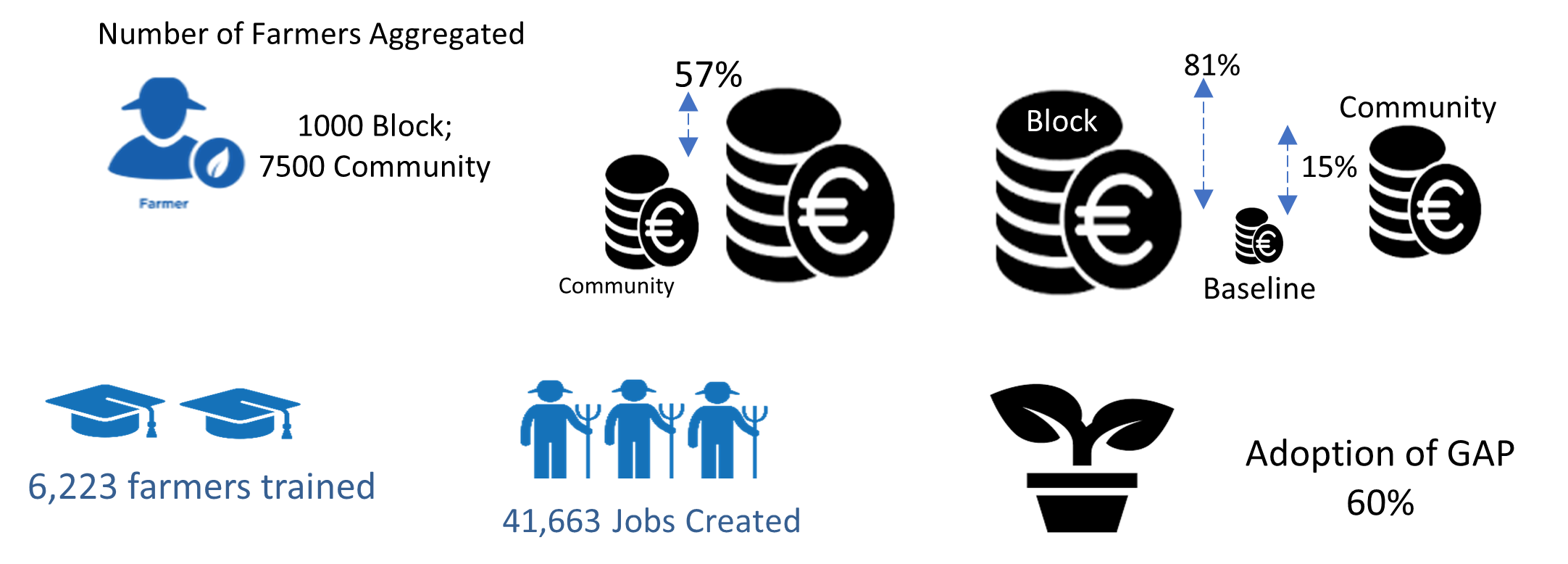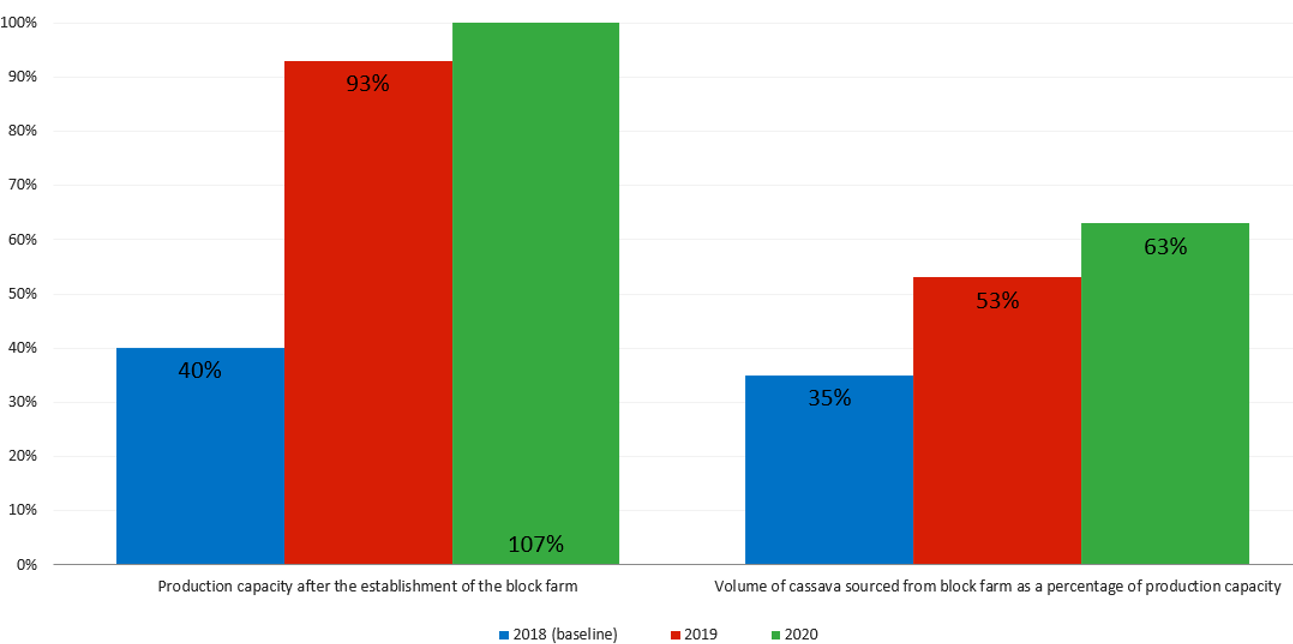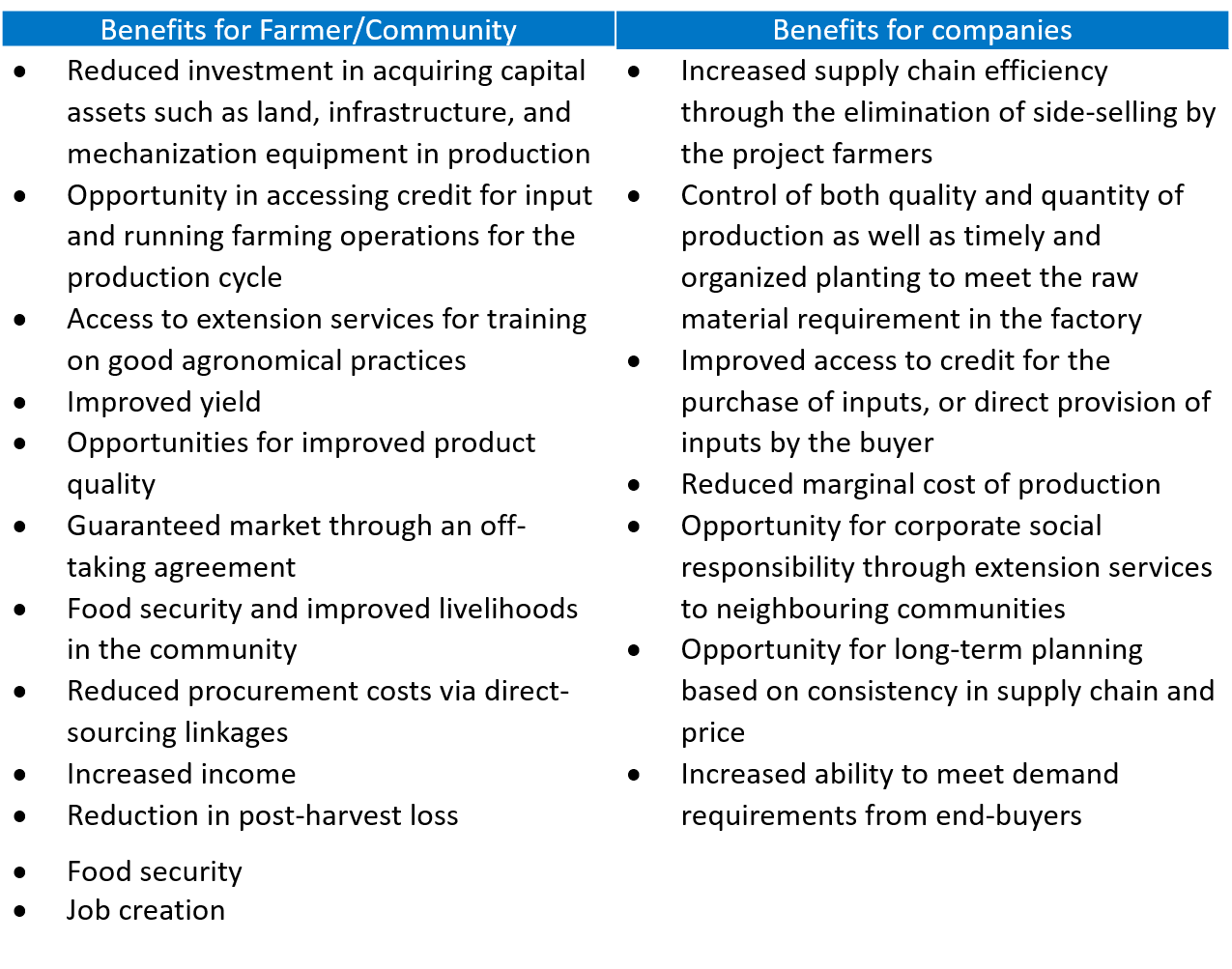The project, after three years, has enhanced PIL capacity and growth, guaranteeing supply to the factory and improving the livelihoods of smallholders in the supply chain. We outline in this report some of the results achieved by PIL through IDH’s TA support.
Service provision grafted into the supply chain
An essential component of the project is the service provision. PIL as a service delivery operator provided support services to farmers both through internal resources and third-party engagements. Through the project, IDH aimed to improve smallholders’ knowledge, support them to access production inputs, and produce sustainably for improved livelihoods. The service provisions enhanced productivity, thereby increasing supplies for processors that will enhance production capacity.
The 1,000 farmers (block farmers) who were directly linked to the company’s supply chain through the block farm were allocated 2ha of land each and supported with input services such as mechanization, improved planting materials, and agrochemicals. PIL also provided pre-financing services for farm inputs which the farmers repaid using their harvest and getting cash balance after loan deduction.
60% increase in yield
With the technical support from PIL towards improved agronomical practices and provision of credit, farmers were able to increase yield by almost 60%, increasing cassava supply that will increase capacity utilization of the processing plant to 100% by end of 2020.
The 7,500 external (community) farmers operated outside the block farm, in the neighboring communities. Cassava being a food crop for household subsistence, the community farmers serve the purpose of price stability and food security in the community. The community farmers were trained on good agronomical practices and provided with improved planting materials for increased productivity within the communities.
| Block Farmers |
Community farmers |
| 1. Capacity building through
· training on best agronomic practices
· training on group organization and business skill
2. Establishment of demonstration plot to enhance adoption
3. Organize field days
4. Input financing
5. Transportation/logistics support
6. Market linkage |
1. Capacity building through
· training on best agronomic practices
· training on group organization and business skill
2. Establishment of demonstration plot to enhance adoption
3. Organize field days
4. Establishment of adaptation plots
5. Market linkage |
Among the block farmers, the yield has increased by 57% compared to the national average. The farmers attributed this to the introduction and learning of good agronomical practices which was the core intervention funded by IDH.
I want to testify that the farmers in Osoogun and its environs have experienced tremendous increases in cassava yield, working with Psaltry, compared to what they were getting in the past. Our yield has increased from 18tons per hectare to 22 tons per hectare. As a result of technical support provided by IDH in collaboration with Psaltry on Good Agronomic Practices which multiplier effect brought about changes in our productivities and hence has increased our income. This has enabled us to educate our children in Private primary and secondary schools. I was able to renovate my dilapidated house. Part of the challenges we were facing before the project intervention included lack of access to tractor for farm cultivation and lack of access to farm inputs like herbicides and fertilizer. Psaltry could provide all these services as a result of this support. We thank Psaltry and IDH for working together to transform our lives for good.
Mr. Olalere Bamiji
beneficiary of the project in Osoogun, Iseyin Local Government Area of Oyo State.
81% of income increase
Likewise, farmers within the block farm earned an income of US$ 1000 per ha compared to community farmers that earned US$ 640 per ha. Through the project, there is a significant difference in the income of block and community farmers by at least 57%. Results further show that the block and community farmers earned 81% and 15% respectively, more than before the project. In the area of pre-financing, within the last two years, PIL pre-financed 500 farmers with the sum of US$ 138,031.98 in 2018 while US$ 244,098.23 was spent as pre-financing for 800 farmers in 2019.
Job creation
A total of 6,223 farmers have been trained on different cultural and agronomical practices related to cassava production and the project has created a total of 41,660 and 40 temporary and permanent jobs respectively in the two years of the project.
PIL has expanded its block farm from 1,000ha in 2018 to 1,600ha in 2019 and 2000ha in 2020. With this, the block farm supplied 53% of root requirement in 2019 and 67% in 2020. Cassava sourced from the block farm has increased production capacity of PIL to 93% in 2019 and 107% in 2020.

Change in production capacity

Other Project KPIs
| |
Parameter |
2018 |
2019 |
| 1. |
Yield (tonnes) |
|
|
|
· Block farm |
22 |
22 |
|
· Community farm |
20 |
20 |
|
· Baseline |
14 |
14 |
| 2. |
Credit for farmers through pre-financing |
|
|
|
· Number of farmers |
500 |
800 |
|
· Total amount (US$) |
138,031.98 |
244,098.23 |
| 3. |
Jobs – Total permanent jobs created (factory and field) |
16,063 |
25,600 |











